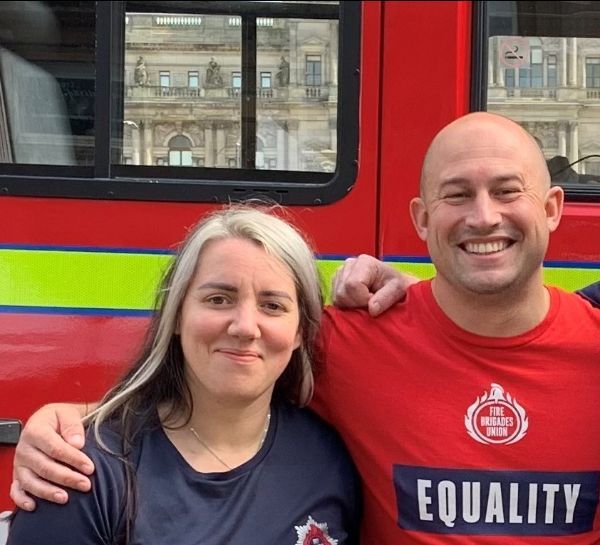TUC South West Rep of the Month
April 2024 - programme skipped due to staff illness. Will resume in May.
March 2024
Amanda Mills and Matt Senior - FBU
“Keep going, be patient, keep fighting the good fight, and never underestimate any individual member because they all have a huge, huge effect.” – Amanda Mills

Joint reps of the month Amanda Mills and Matt Senior show the power of a collective when empowered with strong leaders – though they are unassuming, it doesn’t take long to see how deeply driven and committed they are.
“I started working in schools in 2009,” recalls Matt, “and reading some of the things that then-education secretary, Michael Gove, was saying about my new profession and some of the slurs he was using against teachers, when they actually were doing their best under the threat of cuts – I felt the way they were setting the ground for turning off public support when teachers eventually resisted. It landed with me really hard; the more attention I paid, the angrier I got. He’s to thank for that. I realised we have no power unless we stand together.” His story shows the power of anger to inspire action, knowing that working people deserve dignity and respect.
Amanda, meanwhile, started her union activism through the FBU pensions’ strike; a crash course at the beginning of her now-15 years as a firefighter which showed her very quickly the power of collective action. “I didn’t understand what was going on, but I felt the energy around me and I just knew something awesome was happening.”
They were both established trade union figures when they read the fire authority papers and found out – through that means – that the authority intended to reduce the staffing on each fire truck from five firefighters down to four; there was no official consultation. “It had already been agreed before we started campaigning”, says Matt. They kicked into high gear – mobilising in every direction, bringing together a petition and rallying firefighters and community supporters (including the Bristol Trades Council, the NEU, and the TUC South West) in front of a key council meeting.
Ultimately their victory came through more quickly than expected when they were able to convince councillors that they couldn’t support the cuts to the fire service; whether through simple logic and concern for health and safety, community support for the firefighters and the electoral threat that posed to councillors, or the existence of another source of funding to support the current provision for a different year – most likely a combination of all three. They stress the need to ensure that the authority holds to their agreement of the alternate plan in order to maintain the victory won last week.
They also speak enthusiastically of the next goals for how they will continue to improve conditions for firefighters. Amanda highlights the FBU’s ongoing fight for 52 weeks maternity leave across every service, and the ongoing decontamination campaign which protects firefighters from excessive exposure to contaminated fire gear. “The fact that fire deaths are increasing in the UK at the moment isn’t something that should be taken lightly,” says Matt, “even though they’re increasing from thankfully much lower numbers than they used to be – and that’s due to the work the fire service has done over many years.” They demonstrate the true care and consideration trades unionists give to their vocations and professions – so often, we are the ones at the front line demanding proper provision and protection for working people in every walk of life, ensuring a decent standard of living across the board – as well as what can be achieved when working closely with trusted allies in a strong union branch.
The power of being organised is in having members who are invested in what your union does; it doesn’t happen overnight, it’s something you have to build. I was going to use a fire analogy – I’m not going to do that. But it’s very powerful. People don’t realise the power they have unless they unite with other people. We achieved what we did simply by making noise, being seen, being counted in numbers, raising our arguments. People underestimate themselves in exactly what they can achieve if they stand next to each other.
- February 2024 - Rebecca Hillman, UCU/Exeter Trades Council
-
"I saw first-hand how important trades councils are. I saw it not being there, and then I saw what happened when it was running, and the kind of things it could support." - Rebecca Hillman
- January 2024 - Nick Moore, UNISON
-
Nick Moore is the kind of trade unionist you want at the helm of the ship when the waters get rocky. Though he insists he isn’t a natural activist, nor “one for confrontation”, he shares that he simply saw the need for accountability in his workplace and decided to step forward as a representative in Sodexo four years ago.

His observation could be called prescient. In 2023, his employer made the shock decision not to pay their staff a lump-sum pay rise agreed in national negotiations. As outsourced workers in the NHS, Sodexo have been included in national pay agreements for over a decade – yet this time around, Sodexo in two trusts unilaterally declared they would not be paying the lump-sum component of the pay award. (It was paid in the other 22!)
Nick spearheaded a campaign to have the lump-sum payment paid to all Sodexo staff at his trust. He fires on all cylinders, launching: a collective grievance through appeal stage, a petition with 600+ signatures, a shocking survey on the impact to staff morale – which was a rude awakening to management. Nick then recruited 16 of his colleagues to form a committee for industrial action and launched a ballot, which consultation shows has 99.5% workplace support.
I started doing this because I saw people being treated unfairly, discriminated against – it felt like someone needed to step up. That shouldn’t be happening. Before I started, they didn’t really have a rep – so the company could do whatever they wanted.
Unless Sodexo and the trust agree to pay the lump sum before then, UNISON expect to take strike action in mid to late February. Over the course of the campaign, there has been a shift towards perception of the union; people have come to him proudly declaring "I joined, and I got my mate to join". Union membership and activism snowballed; membership rose by approximately 45%. “I’ve never known so many people joining in such a small time - people want to be in on it and part of it,” says Nick.
When asked what every worker needs to keep in mind, Nick stressed that a lot of managers aren’t aware of workplace policy or legal requirements and that workers shouldn’t necessarily believe what they’re told. Also, avoid conversations off the record – there should not be any reason for these to take place.
Truly, the campaign has shown that when times get rough, there is power in a union. There can be no justice without accountability, and true accountability can only come from collective action with competent leaders like Nick at the helm.
If there were 20 members saying they're going to go on strike next month, it wouldn't bother them. 85% of the work force - then they're in trouble. But the more people that join and the more people that take a stand, the more chance you've got of winning.
- December 2023 - Nick Johnson, ASLEF
-
Nick Johnson has a warm energy which is noticeable right away; he is convivial, easy to talk to, and personable.
Like many train drivers, he joined the union from the moment he started on the job 24 years ago; but Nick expressed that it wasn't until he needed the union's help that he really started to understand its value, as well as the value he could add. "I saw the power of trade unions at their best", he explains. Four years ago, Nick took on the role of assistant branch secretary.
Before getting involved with ASLEF, when working spare (the train driver's equivalent of being on-call, where they sit in the break room until a train needs a new driver), Nick realised he could make use of the time to cook for the others and thereby increase staff morale, which had been low. "I enjoy doing things for other people," he explains. This set the tone for his ongoing role as a steadfast, supportive member of the workplace and its union, which later informed his strategy for building morale at the picket lines.
Seb Michnowicz, ASLEF Branch Secretary, highlights the value of Nick's generous and diligent approach, and how it has been transformative to the industrial action over the past years: "There was the mammoth task of checking the accuracy of branch membership records so that our strike ballots complied with draconian anti-union laws, where Nick identified and carried out dozens of corrections that needed to be made. When it was time to go out on the picket line, Nick took it upon himself to go and buy food, cook it at home and bring it to the picket line to ensure everyone was well-fed throughout the day. This turned out to be immensely popular and gave our picket line at Temple Meads a welcoming atmosphere that encouraged many supporters to join it.
"We were proud to be able to share the food with striking workers from other unions (particularly the CWU whose action often coincided with ours) as well as the homeless who passed our picket line and it was all thanks to Nick’s initiative. He also began cooking food for RMT pickets lines which has helped encourage stronger collaboration between our unions and a closer working relationship between reps which can be hard to achieve given the random and unsociable hours worked by railway staff." -Seb Michnowicz, Branch Secretary
Nick is a true 'unsung hero' of our movement, willing to identify and take on the least glamourous drudgework to ensure the effectiveness of the action and the wellbeing of his comrades. He reminds workers to always stay true to their beliefs and remember the power of the union - none of us are in this by ourselves. You can find him on the picket line on Thursday (7 December 2023) at Bristol Temple Meads - or pop by another ASLEF picket line this week (Great Western and Cross Country are out on Thursday, while South Western Rail are out on Wednesday).
"When there's a table there, and food, it brings people together around it, like a family. The table forms the centrepiece of the picket line. Without it, the only thing we'd have to put our drinks etc on would be the lid of the council bin! Also, we have been gifted boxes of sweets, biscuits, and other food items by supportive members of the public and other unions & the table literally provides a platform for it all." -Nick Johnson
- November 2023 - Zoe Layland, GMB
-
Zoe Layland has been a trade unionist since before she can remember; daughter of a health and safety officer who secured proper footwear for his workplace, she always had the instinct and understanding of the power of trades unionism.
During the Covid lockdowns, Zoe kicked into action to protect her colleagues. At the time employed by a private, hostile employer, she campaigned for proper PPE on the back of her own diagnosis of Covid.
Shifting to work for the Council, as a GMB rep, Zoe saw firsthand how powerful collaborative working with a friendly employer is; unlike her prior employer, the Council were eager to benefit from the expertise of their union health and safety officers, and enthusiastically implemented many of the suggestions brought forward. This inspired Zoe to push for stronger workplace rights and supportive policy, paving the way for adjustments and accessibility which in turn protected the work life and livelihood of colleagues struggling with Long Covid.
Zoe has leaned into the power of Trade Union Education to soak up as much knowledge and understanding as she can to benefit her members and strengthen her voice. Above all she encourages other reps to take advantage of every avenue for training and development they can.
Helen Coley, GMB Regional Organiser, said Zoe "has approached representing and supporting members with passion and enthusiasm and has assisted members at some of the most challenging times in their working lives, including grievances, disciplinaries, sickness absence, conduct issues and equal pay issues. She is one in a million, has the most wicked laugh, kindest heart and incredible ability to stand up for members."
- October 2023 - Karen Linforth & Kay Timbrell, Usdaw / Stroud Trades Council
-
In October our Reps of the Month won jointly - Usdaw activists Kay Timbrell and Karen Linforth, the potent double-act who launched the region's newest Trades Council in Stroud.
"It's a bit hard to believe that we've actually achieved it. It was such a gradual process - and all of a sudden, we've got a trades council." -Karen Linforth
Karen and Kay demonstrate the incredible power that comes from trust and synergy; they have complementary skills and styles, and they delegate work strategically between them. Kay describes, "I'm the more sensitive one, I wear it on my face. Karen is more level-headed, when I need to be pulled back, she pulls me back; when she needs to step up I'm the one to agitate her. Between the two of us, it works beautifully... and we use what we're best at individually to decide who will lead on each meeting at work."
They were inspired to reach out to fellow trades unionists through networking at Tolpuddle, with support from Dave Chapple, then spent several months firing on all cylinders - reaching out through the local Labour networks, through the TUC South West networks, and even running stalls in town to make connections organically. They became unstoppable, finding that the people they brought in went on to recruit even more; their network grew to 20 people ready for the launch of the new Trades Council.
Usdaw Regional Secretary, Mike Walker, said, “Both Kay and Karen have been hardworking reps for many years both at Tesco Stroud and within the wider Usdaw family. The formation of the Stroud Trades Council is testament to their commitment and willingness to succeed. I am sure it will be a great success and wish all concerned the very best for the future”.
TUC Regional Secretary, Ines Lage, said, "Karen and Kay are such a great representation of our movement; so value-led, driven to support anyone who needs their help. They get their motivation from helping people."Looking to the future, they plan to make the stalls a regular fixture in Stroud, to deepen connections between trades unionists and strengthen community outreach, and also to build and maintain effective working relationships with their neighbouring Trades Councils.
Kay and Karen's activism serves as a powerful reminder of the value of proactive solidarity and building human connections across the movement. They are both motivated by a sense of empowerment in being able to help others, accompanied by the comfort and security of knowing that others are there to support them, too. And ultimately, that's trades unionism at its finest. - September 2023 - Andy Mitchell, Unite
-
Andy may be soft spoken, but it doesn’t take long to recognise that he is a true force of nature. Having weathered his own path through the inhumane benefits system, he became dedicated to campaigning for justice and reform, against wave after wave of attack on vulnerable people through the Universal Credit reforms and cuts. His journey took him to Unite Community.
"We need to be looking at our members holistically. If they have a problem with their benefits, that's going to have an impact on their working life. Benefits have become an essential income that so many families need to live on, and trade unions need to support those people."
It was Andy who sounded the alarm to Unite about draconian changes to Universal Credit. He has spearheaded “Unite Against Sanctions” and the slogan “Social Security is a Trade Union Issue”. Andy has successfully transformed his cause into a national campaign with the external goal of combatting injustice in the benefits system, and the internal goal of ensuring all Unite reps are able to signpost affected workers to the support they need.
Andy is at the front of fighting for basic dignity and the right to a decent life for all ordinary people; the value of his work will be felt by thousands of union members across the UK.
Know an inspiring rep or union activist? Nominate them to be an upcoming Rep of the Month!



